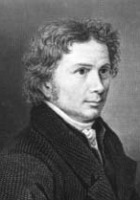Bernhard Severin Ingemann
Bernhard Severin Ingemann Poems
Tre Dage var jeg atter i Bamyan Gæst;
Een Ridder kun mig fulgte, og det var John Præst.
De raske Provençaler alt Spirene svang;
...
A castle stands ’neath western skies
Gold shields its roof have studded;
The evening sun behind it dies
Midst cloud banks so newly ruddied.
...
The sun that in the East does rise
Drapes clouds with golden gown,
O’er seas and peaks it sails the skies,
O’er countryside and town.
...
ALL the sky was dull and drear,
But what cared I!
For my sky shone bright and clear
In Eliza's eye.
...
Bernhard Severin Ingemann Biography
Bernhard Severin Ingemann (May 28, 1789 – February 24, 1862), was a Danish novelist and poet. Ingemann was born in Thorkildstrup, on the island of Falster, Denmark. The son of a vicar, he was left fatherless in his youth. While a student at the University of Copenhagen he published his first collection of poems (1811; vol. ii., 1812), which show great influence of German romanticism. Critics describe their sickly sentimentality as reflecting the unhealthy condition of the poet's body and mind at this time. These works were followed by a long allegorical poem, De sorte Riddere (The Black Knights, 1814), which closed his first period. Then followed six plays, of which the best is considered to be Reinald Underbamet (The Miraculous Child Reinald, 1816), and the most popular, Blanca, (1815). In 1817 he published his first prose work, De Underjordiske, et bornholmsk Eventyr (The Subterranean Ones, a Story of Bornholm), which was followed in 1820 by Eventyr og Fortœllinger (Narratives and Miraculous Tales), many of them imitations of Hoffmann. During 1818-19 he traveled on the Continent, and in 1822 was appointed instructor of the Danish Language and Literature at the Academy of Sorø. During his next period, inspired by Scott's Waverley novels, Ingemann produced his series of historical romances, by virtue of which he disputes with H. C. Andersen the title of the children's writer of Denmark. Their subjects are all taken from Danish history. The first, and perhaps the best, is Valdemar Seir (Valdemar the Victorious, 1826), which was followed by Erik Menveds Bamdom (Erik Menved's Childhood, 1828); Kong Erik og de Fredløse (King Erik and the Outlaws, 1833); and Prins Otto af Danmark og Hans Samtid (Prince Otto of Denmark and his Time, 1835). While his historical romances show a lack of accuracy, their strong nationality gives them a special interest to the student of Danish culture. In reality they mean the introduction of the historical novel in Danish literature. A later artistic novel Landsbybørnene from 1852 ("The Village Children") is now almost forgotten. Known as the fourth great Danish hymn writer (after Kingo, Brorson and Grundtvig), Ingemann is considered less rooted in Biblical dogma and more borne up by a general spiritual and religious interest. A simple naivete runs through them. Especially popular were his Morgen og Aftensange (Morning and Evening Songs), a collection of religious poems of great beauty and spirituality written during 1837-39. They were set to music by the composer Weyse. Many of them have been classics in Danish schools (for instance I Østen stiger Solen op – ”In the East the Sun rises” and Fred hviler over Land og By – ”Peace is resting over Land and Town”). Also his Christmas hymns are popular. He also wrote poems of historic and mythological content in the heroic saga Holger Danske (“Ogier the Dane”, 1837. He was a personal friend of Grundtvig who was in some degrees his mentor and with whom he shared a deep interest of Danish medieval history. Often they have been regarded almost mental twins in spite of clear differences. Also Blicher and H. C. Andersen must be mentioned among his friends. Ingemann was in his elder years much respected and after the death of Oehlenschläger he was regarded the unofficial poet-king of Denmark. Critics cite Ingemann's grace and delicacy, rather than strength, of style, both in prose and poetry. He died in Sorø.)
The Best Poem Of Bernhard Severin Ingemann
Afskeden I Bamyan
Tre Dage var jeg atter i Bamyan Gæst;
Een Ridder kun mig fulgte, og det var John Præst.
De raske Provençaler alt Spirene svang;
De vilde deres Riger regere med Sang.
5 Den største Østens Krone blev Friserens Løn;
Men først han vilde holde i Paradiset Bøn.
Den Herlighed, dog Jorden har ejet engang,
Jeg tænkte vel kan findes, er Vejen end lang.
Jeg hilsed Kong Carvel; jeg tog ham i min Favn;
Jeg nævned ham Carolus: det var hans Kristen-Navn.
For Gloriant jeg bøjed mit Knæ for sidste Gang,
Og lydelig Gudsenglen i Hjertet mig sang.
Men aldrig i Verden mit Øje mere saa
Den Paradisfugl, min Haand ej skulde naa.
For sidste Gang tog jeg Smaadrengen paa Arm;
Til Afsked han putted sit Hoved i min Barm.
Jeg kyssed hans Pande og hybenrøde Mund;
Paa Hingsten jeg svang mig alt i den samme Stund.
Om Paradiset sang ved min Side John Præst;
Tilbage dog stirred den tankefuld Gæst.
Ved Bamyans Port jeg saa endnu en Gang
Den dejliges Slør, som paa Lansespidsen hang.
Paa Bamyans Taarn jeg skimted allersidst
De Sjæle, jeg genfavner i Himmerig dog vist.
